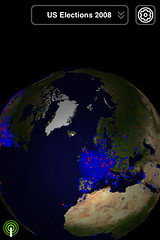Banned from WMLProgramming
February 08, 2009 | CommentsI seem to have been banned from the WMLProgramming mailing list, ending the 9 or so years that I've spent there. I'm not entirely sure why - my last posts there weren't particularly controversial, pointing out that lots of transcoder products include features to add navigation bars; and suggesting that the developer community engage more with operators to minimise the damage done by irresponsible deployments.
Most likely, the list moderator (Luca Passani) has lost patience with me. Luca, I, and others have been debating lots of the issues around transcoding over the last 6 months. We frequently disagree on the detail of how to approach it, though when it comes to the basics I've long felt that we're in agreement: this is a serious problem and one that needs to be dealt with. My willingness to debate the issue politely with Luca has led to my being categorised a "bad faith arguer" - the implication being that I don't actually believe the points I'm putting forward, but choose to do so to annoy or otherwise aggravate.
Absolute poppycock, of course. I'm saying this stuff - and putting my own time into the W3C MWBP Group - because I actually believe it (and have done for some time). Despite what Luca might wish to present, like many complex issues this isn't black and white, but nuanced: there are many opinions, and many subtleties. Recently I've been disagreeing with Luca on the likelihood that, say, OpenWave develop features in their products that they promise to never deploy. Do this mean I blindly support transcoder vendors in what they're doing? No - at the same time I'm arguing with Charles of Opera that transcoding of HTTPS links is dangerous from a security perspective.
The standards of acceptable behaviour on WMLProgramming seem one-sided. On the one hand it's acceptable to call the W3C participants "fuckers" or "assholes", those who debate with you "collaborationists" and "morons", or transcoder vendors "arrogant bastards that need to be treated as the beasts they are". It's considered an adult approach to "keep telling them how much we hate them until they don't cease and desist". It's OK to call the W3C fuckers "because they deserved it". And arguing in bad faith is only possible, it seems, if you're on the other side of the table from Luca.
At the same time it's unacceptable to politely and repeatedly disagree with Luca on these issues. When I do so, it appears that I become the enemy; it's asserted that I'm only arguing to distract from the issue, my motivations are questioned, it's snidely insinuated that I might be on the payroll of operators or transcoder vendors... all fairly childish and unpleasant stuff, and not a tactic that's confined to me (an ex-Vodafone employee expressing an opinion, for instance, was dismissed as a "troll")
This double-standard is annoying to have to deal with, but I worry that when this childish and abusive view is presented as being representative of the "development community" (if there is such a thing), it does us all harm. I find it embarrassing to be associated with: this is not how I want my position presented publicly, and I know I'm not alone in thinking there must be a more adult way to discuss these issues. I don't accept the line that the seriousness of the issue justifies a "no holds barred" approach: governments debate much more serious problems (nuclear proliferation, say), without resorting to name-calling.
When Luca threatened to ban me a couple of months back, I was touched to see a few messages of support pop up on the list, asking him to reconsider. At the same time I've been told off-list that at least one message of support didn't make it onto the list. It looks like there's some level of censorship going on, without accountability or objectivity. Dissenting views are important for debate, and we're unlikely to persuade the transcoder industry to self-regulate without talking to them about it. To this end a place where all parties can meet and discuss openly in a civilised environment is important: I don't think WMLProgramming is that place.
All of the above is a bit sad really - WMLProgramming is a collection of some very knowledgeable and talented folks, and with write access removed I'll be unable to contribute, or to correct some of the more outlandish assertions that pop up there with worrying frequency. At the same time, I'll have a bit more spare time (which is welcome right now) and a reason to investigate some of the other fine mobile development resources out there like mobiforge or the BetaVine forums. I'd be interested to hear about any others that might be lurking out there...
Polarising mobile sales
February 04, 2009 | CommentsMobile phone sales are polarising, apparently: "it is clear that people are either getting devices that have functionality that really adds something to their life - making their life better, more enjoyable or more productive - or they are going for a cheaper type of deal"
One of the things that Trutap surprised me with was the revelation (to me at least) that in "developing" markets like India, smartphones are a popular choice despite their high cost relative to average incomes... the rationalisation being that if you're going to spend a greater chunk of your income on a mobile device, it had better be a decent one, and something you'll keep for a long time.
Recession hits the UK, and it looks like the same cost-conscious behaviour follows in its wake...
Edge conditions and mobile
February 01, 2009 | CommentsInteresting post listing some of the error states specific to mobile; one of the beefs we have had with classic Visio wireframes for representing flow through mobile services is the number of interruptions, error conditions, and recoveries which seem to blight mobile: latency, cost of data, battery life, storage and memory limitations, etc.
On the other hand, dealing with some of these issues is really finicky: take identity as an example. On the web, it's straightforward: username and password to login to a site, cookies to identify repeat visitors. On mobile aspects of identity are frequently split between the device (e.g. cookies in the browser), the SIM card (identifying your mobile number and providing a route to a billing relationship with you) and sometimes elsewhere on the network. Take that handset you used to login to that mobile site, sell it on ebay, and suddenly someone who looks like you to the site, but isn't, has access to your stuff - potentially with yourself footing the bill.
Lots of nasty edge cases here, many of which I remember our looking through in great detail during the early days of projects like Flirtomatic and Trutap. Whether it's worth designing systems to accommodate them all, or better to leave edge cases to customer support, is a different matter - and there'll be a balance to be found here.
Delightful maps and location-based gravy
February 01, 2009 | CommentsSmule have a lot to answer for.
In odd moments on train journeys, waiting for meetings or when bored of television, I'm finding myself turning to one of their apps with increasing frequency. I first came across these guys when someone played the Ocarina video at Future of Mobile last year, and I've downloaded a few of their apps since then: the Ocarina itself, SonicLighter, and most recently Zephyr.
I suppose the best way of describing these would be social, geographic toys: do something, and see other people round the world doing similar things. In the case of SonicLighter, all you're doing is running the app; there's a screen when it begins where you flick-start a virtual cigarette lighter, but all the action occurs on a world-map where you can see locations from which other SonicLighter owners have used the app in the last 24 hours.
Ocarina and Zephyr take this principle and make it more expressive - in the case of the former, you play a song on your iPhone or hear other songs being played around the world (together with a lovely visual representation of where they're coming from, on a nicely drawn globe). Zephyr lets you trace out a message on the screen of your iPhone, send it off on its travels around the world, and brings other messages to you.
It's difficult to overemphasise how cute I find this stuff, and how much I get simply from being aware that there are other people out there, anonymous to me except for their location and the fact that they're doing the same thing as me: the connection is the meat here, and the activity around it just gravy. There's something wonderful and very human about seeing a message slowly get etched out onto your screen, after watching it ebb its way across the Atlantic Ocean, or bounce from city to city.
And of course, Smule have done a great job of keeping the whole experience smooth: no registration required, good maps, and a carefree exploration of the apps seems to be encouraged throughout.
I also note that they're starting to do a bit more with them. SonicLighter now asks me "who I'm lighting up for" and gives a number of options. Here's a distribution of who lit up for who in the recent US election:
Lessons learned here? The connection can be the application. The trivial can become interesting when you can see others doing it at a distance (perhaps only then). Identity isn't a necessity for social software - I don't know or care who the other people are on these apps, that's half the fun. And location-based apps can be delightful too :)
De-cluttering
January 31, 2009 | CommentsFirefox groans under the weight of tabs, it must be time for a link-dump:
- Mobclix have some great stats on iPhone App Store downloads, MarkJ summarises them nicely, and PEE points the way to iPhone app success;
- Ow. Some fairly outdated views on mobile, music and DRM from Hugh Griffiths of Microsoft (wasn't he previously at O2?); locking music purchases to handsets? Hopefully this'll be one of the things MS amend and change after getting feedback from users, few of whom I can imagine will support such locking;
- For reasons which I hope will become apparent later this year, we're very interested in cross-cultural design right now: putting Hofstede to bed, the washing machine that ate my sari, and this excellent article on design for international users have been good brain-food;
- Robots: organic and sweating;
- Palm vs Apple, a lawsuit seems inevitable...
- And for comedy value, SnifTag (eerily similar to a use case we stuck into some design work for an operator back in 2003), and I Get Your Fail, a blog of game cockups (probably getting funnier the more you know about rendering technology, I suspect);
- Cute example of thinking beyond the UI your software provides, courtesy of 37signals;
- Mobile marketing is "burning hell hot" - more details of the ad campaign Tomi Ahonen referenced at the Future of Mobile last year: "Tohato introduced two very spicy snacks, the one called ‘Burning Hell Hot’ and the other, his archenemy, ‘Bazooka Deadly Hot’. The two flavours were represented as masters of an army that could be joined by buying one of the two flavours in the supermarket. Using the QR-codes – 2D barcodes - on the packaging, the consumer could join the army of his master in a massive online multiplayer game. Every night at 4 a.m. a new battle between the two armies would start at one of the 31 different online battlefields, indicated with names like ‘Sweet Suckers Execution Hall’ or ‘Ouch, The City of Anal Torture’. By either training or recruiting friends to signup, players could get promoted and have a better chance of winning. "
- Interesting interview with Roger McNamee of Elevation Partners, who've funded Palm - particularly good to hear him critique the iPhone as a device strong on consumption, weak on production;
- Depressing news from the average hotness rating of various academic disciplines;
- Conference videos from PICNIC last year - yay!





